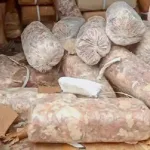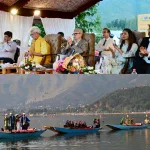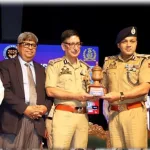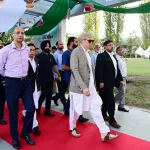Sheikh Fayaz is gifted with the quality of providing a distinct mould to Chhakri singing, a traditional melodic folk music of Kashmir, that evolved in the valley many decades back. He popularised tumbakhnaer – an earthen-shaped musical instrument – among male singers, which otherwise used to be associated with amateur women singers.
Making daff an indispensable part of Chhakri singing is also by and large the result of his creative experience.
Apart from this, the most unique facet of his work is singing the translated Bollywood songs of the 90’s, mostly of Kumar Sanu and Udit Narayan, which were huge hits those days. From Baazigar to Dilwale, Sheikh Fayaz says the translated songs evoked an overwhelming response here.
For example:
Sattan Peeran Yaara Seeth Seeth Be Roazai Yaad
Duniyaa Manz Neerith Toati Karai Be Czey Seet Pyaar
These are the translated lines from a song from the 1994 Bollywood film Dilwale, sung by Kumar Sanu and Alka Yagnik. The Hindi lyrics are:
Saaton Janam Mein Tere Main Saath Rahungaa Yaar
Marr Bhi Gaya Toh Main Tujhe Karta Rahungaa Pyaar
Similarly, he sang:
Chaanen Wattaniy Gaaraan Chhus
Mohabbat Czey Seet Karaan Chhus
This is the Kashmiri version of
Teri Adaaon Pe Marta Hoon
Love Tujhe Love Me Karta Hu
This Kumar Sanu and Alka Yagnik song is from the 1995 movie Barsaat.
“These translated songs were mostly from the early to mid-1990s and included Bollywood films like Baazigar, Raja, Raju Ban Gaya Gentleman, to name a few, and people loved all of them.
” I have sung around 500 translated songs – from Bollywood to other Hindi or Urdu songs to poetry of many languages,” Fayaz told Rising Kashmir, adding that all these songs and poetry were translated by Azad Mushtaq, a local Kashmiri poet.
The idea, Sheikh said, came as Bollywood songs of the early ‘90s became a huge hit, and Kashmir was no exception to like them.
“People in Kashmir used to listen to Kumar Sanu and Udit Narayan religiously. Such was the craze of these singers that our translated versions also become a huge hit,” he said.
After gaining popularity, Fayaz was one of the highest-paid Chhakri singers in the valley, charging a minimum of Rs 10,000 in the mid-1990s for singing for a night, mostly on mehandiraats – a night preceding the wedding ceremony.
Among his most popular albums include ‘Sarhad Maashoak’ – 1995, ‘Khatij Naama’ – 1998. According to Fayaz, it was translated by one Ali Shah Moulvi, and became a household name in the valley.
Sheikh, however, regrets the dying art of Chhakri, saying people are now less interested. The reason, he said, is that today’s lyrics are “not up to the mark”.
“Just like the quality of Hindi songs is declining day by day, the same is the case with Kashmiri songs. Earlier, the lyrics used to be of quality and modest. Also, there is a massive change in prose and language. Even the Kashmiri language is dying. This is sad and unfortunate,” he lamented. “
Also, the Ustaad (music teacher) was of great significance and used to be revered like a saint. That culture has been lost now. Still, there are many who carry on the legacy with sincerity.”
Another issue faced by folk music is that there is no union representing it at all.
“There should be a union. Only then we can preserve this cultural heritage of Kashmiri music. The Kashmiri language should also be promoted to keep all types of Kashmiri music alive forever,” he said.
Fayaz believes every form of music has its own charm and influence and that the Chakkri is unique from the other forms of Kashmiri music in the sense that its audience is common people unlike Sufi or other genres which have their particular listeners.
“Like other forms, it also upholds the cultural heritage of Kashmir,” he says. “Earlier Chhakri used to be sung only at night during marriage ceremonies but now it is performed on several other popular occasions.”
The rhythmic accompaniments that are used in Chakkri include Rabab, Daff, Nott (an earthen as well as silver pot), Banjoo, Harmonium and Sarangi. “Santoor and Tabla are used on some occasions, and among all these, the harmonium was added later. A dancer accompanies the group only at marriage functions as people insist on it,” he explained.
Sheikh Fayaz said he was interested in music from childhood. “I realized I had a good voice, and it was my grandmother who encouraged me a lot in this journey,” he said, adding, “She is my inspiration.”
Today, the singer only performs at limited functions. “I have passed that peak age of singing, and my health also remains affected,” he said.
He works in the Sericulture department as a daily wager for the last 25 years.
His brother Javeed said that It was the love and prayers of the people in Kashmir that made Sheikh Fayaz a brand name in singing. “Given his contribution to Kashmiri music, the government should honour this living legend,” he said.





